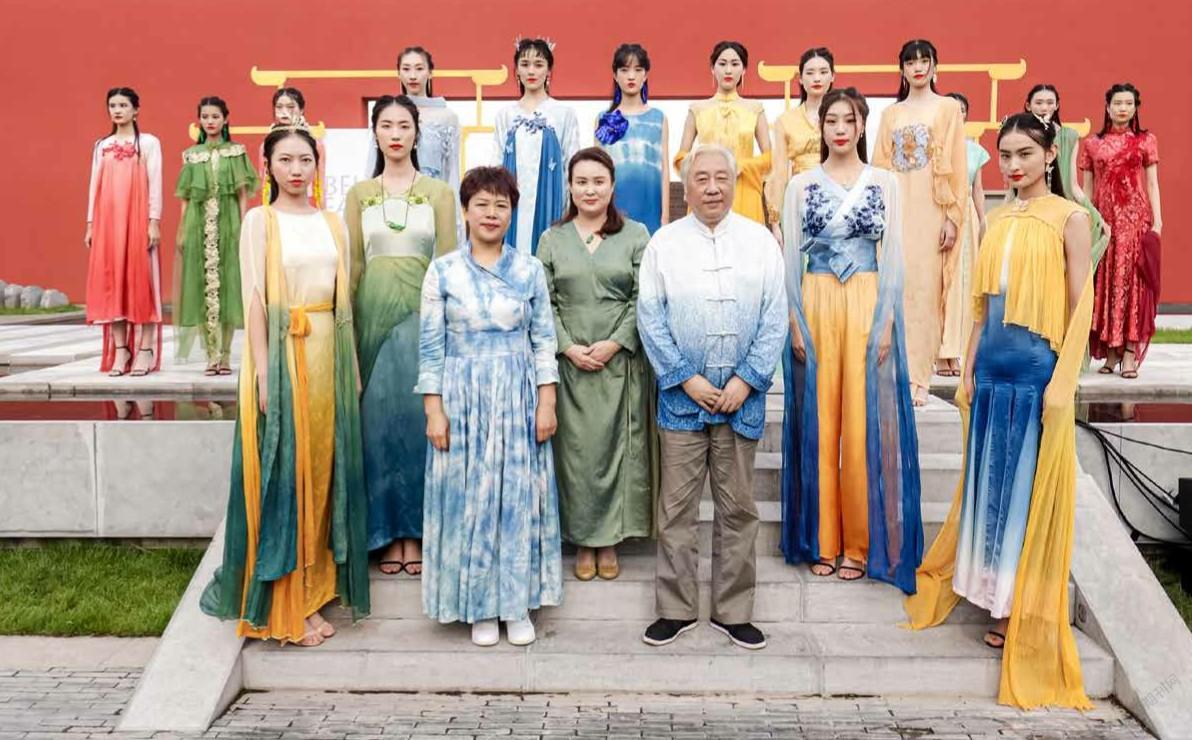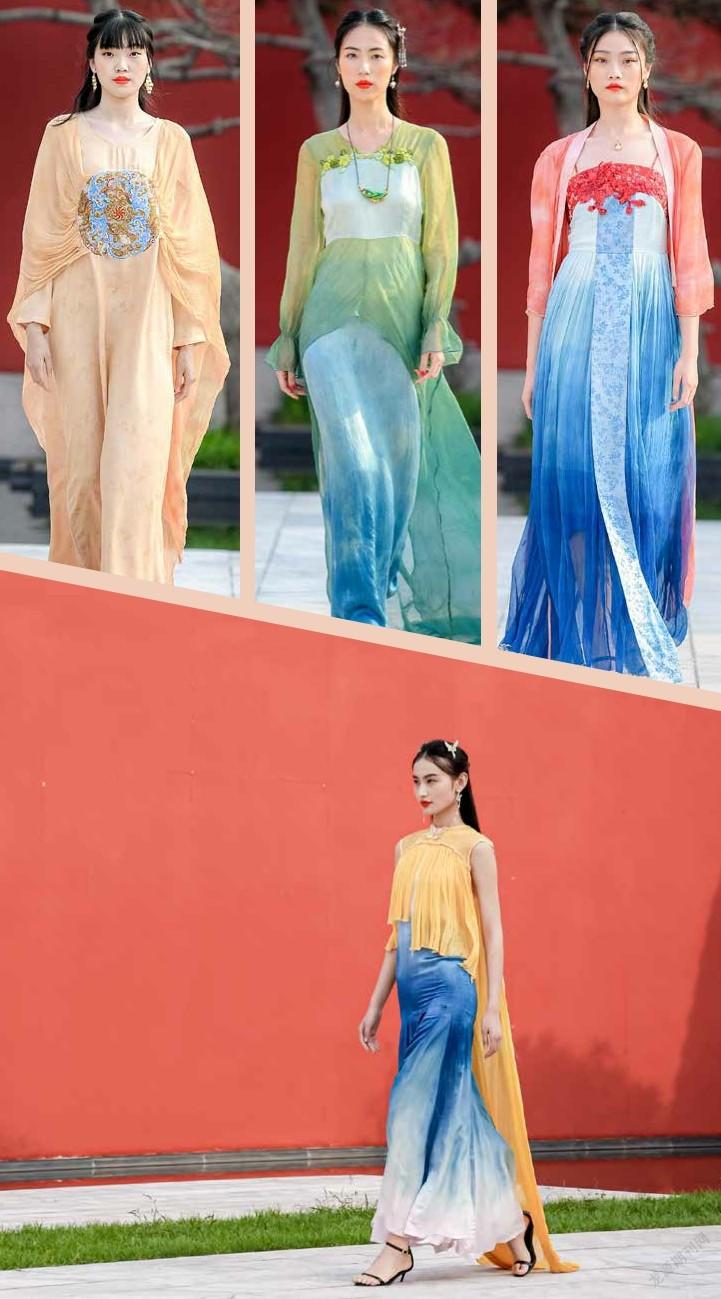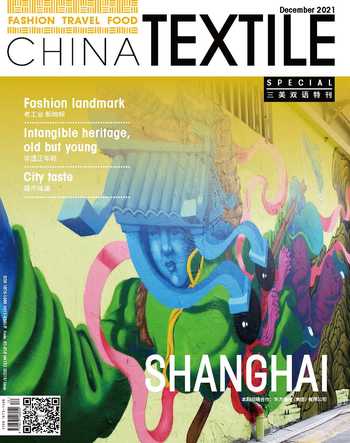把古老的植物染,帶進現代時尚生活

非遺匠心,光耀東方。近日,愉悅YUE BAST首席設計師王恕兒以作品“萬物幻彩染華章”在北京時裝周上奉獻了一場東方美學創意大秀。秀演作品融入了敦煌色系的色彩元素,以色彩變幻的桑蠶絲面料呈現簡約而典雅的設計,廓形收腰等工藝加上天然面料的飄逸感,使得作品展現出靈動脫俗之美。
秀演充分延續和體現了愉悅YUE BAST獨到的工藝和產品特點——植物染色和幻彩面料。愉悅通過與中紡院江南分院及其特聘專家、植物染色非遺傳承人黃榮華合作,共同致力于植物染料與工藝的產業化技術攻關,從而將中國非遺傳統工藝結合當代時尚設計,輸出傳承傳統文化的現代產品。
“Inheritance of Intangible Cultural Heritage, Brilliance in the Orient” creative Hanfu show was held in Beijing’s new cultural landmark Longfu Cultural Square recently during Beijing Fashion Week. Wang Shuer, chief designer of YUE BAST, presented a creative show of Oriental aesthetics with her work. The color of clothing blends into the elements of Dunhuang, obtains color inspiration from nature, and presents the smart and refined beauty of this collection with simple and elegant silhouette and natural fabrics such as mulberry silk.
The show fully continued and reflected the unique process and product characteristics of YUE BAST — plant dyeing and multicolor fabrics. The works released adopt the plant dyeing technology jointly developed by the Jiangnan Branch of CTA and Mr. Huang Ronghua, distinguished expert, and the inheritor of the plant dyeing intangible cultural heritage, which combines the ancient traditional dyeing and printing process with modern industry, and develops modern fashion products with traditional culture.
CT:作為本屆北京時裝周開幕秀參與品牌,請介紹一下本次秀演的靈感來源和設計理念?
王恕兒:本次秀演的設計靈感來自敦煌壁畫,加入現代元素與之相融合。我們用色彩變幻的桑蠶絲面料呈現設計,用收腰廓形的工藝與飄逸感的天然面料相結合,追求一種靈動出塵的美。
此外,這套系列成衣色彩全部來自純天然植物染料,工藝既有面料染色,也有手工成衣染色。同時運用的素染、絞纈、吊染漸變等多種染色技藝,應該說呈現了當今比較高超的植物染技藝水平。
為了準備這次秀演,我們從面料的紋織結構到染色設計都是從零開始著手,所有產品都是第一次發布,希望將中國紡織非遺傳統工藝與當代時尚設計結合,注重繼承與創新,呈現出我們中國傳統文化的自信。
CT:在秀演作品材質運用上,YUE BAST有哪些特色?
王恕兒:本次秀演運用了愉悅家紡的幻彩面料。幻彩面料是通過獨家的紡紗技術,采用一根幻彩紗線實現變幻萬千色彩斑斕的面料。這項關鍵技術獲得了第七屆“中國十大紡織科技獎”,填補了國際國內在色紡技術上的空白。
目前,愉悅家紡的研發方向以綠色產品為主,比如我們的嬰幼兒產品是可啃咬的,非常環保安全。后續我們會繼續以“天人合一”的理念從大自然中尋找高品質產品原料。
CT:非遺植物染的應用越來越受到市場的關注,本次秀演對于植物染的運用,背后是怎樣運作的?
王恕兒:在植物染上我們和中紡院江南分院及其特聘專家、植物染色非遺傳承人黃榮華老師合作,共同致力于植物染料與工藝的產業化技術攻關,打造“可再生纖維+天然環保染色工藝+可自然降解”的全生命周期環保低碳工藝路線。
CT:與其他工藝相比,植物染色在設計研發上有什么難點,目前技術產業化的成果怎樣?
王恕兒:植物染的難點是天然助劑的產業化應用和生產上,但這并不是很大的問題。當今社會做天然助劑領域研究的人非常少,我們和黃榮華老師共同研究打造天然助劑,已成功實現紅、黃、藍、棕、灰等二十余種色系植物染料在嬰童裝、家居服、時裝服飾及家紡產品上的產業化應用。
CT:您怎么看待亞麻的研發空間和時尚趨勢,未來YUE BAST的設計研發方向是什么?
王恕兒:愉悅家紡的亞麻面料非常高品質,我們的亞麻是在烏克蘭種植的。我認為亞麻的研發空間非常大,它本身具有天然、舒適、環保、抗菌的特性,而且具有非常好的肌理效果。我們研發重點是麻和其他纖維的混紡,既優化了麻的手感、垂感,又保持了麻本身的天然特性。

CT:在國潮興起、中國式美學回歸的當下,您認為傳統紋樣色彩、非遺工藝是否迎來復興契機,您在這方面哪些思考和建議?
王恕兒:中國有著歷史悠久的文化傳統,我們的絲綢和染色工藝要比西方國家出現得早,并且更加成熟。比如植物染色遠在周朝開始就有歷史記載,有著數千年的歷史文化積淀,于2013年成功申報省級非物質文化遺產。我相信隨著文化自信的提升,未來的非遺工藝將迎來很好的發展契機,我們也將讓古老的傳統印染工藝和現代工業結合,實現合理有效的工業化產品輸出,研發承載傳統文化的現代時尚產品。
CT: As a participating brand in the opening show of this year’s Beijing Fashion Week, could you please tell us the source of inspiration and design concept of this show?
Wang Shuer: The design inspiration of this show comes from Dunhuang frescoes, and it is integrated with modern elements. It presents the smart and refined beauty of this collection with simple and elegant silhouette and natural fabrics such as mulberry silk.
In addition, the colors of this collection are all from natural plant dyes, and the process is both fabric dyeing and hand dyeing. Meanwhile, it uses many dyeing techniques, such as uniformly dyeing, tie-dye, dip dye, which shows the level of today’s superior plant dyeing skills.
In order to prepare for this show, we started from the texture structure of the fabric to the dyeing design, and all products were released for the first time. We hope to combine the traditional Chinese textile intangible cultural heritage technology with contemporary fashion design, pay attention to inheritance and innovation, and present the confidence of Chinese traditional culture.
CT: What are the characteristics of YUE BAST in the use of materials in the show’s works?
Wang Shuer:This show uses the multicolor fabric of Yuyue Home Textile. The multicolor fabric is the use of a multicolor yarn to achieve a variety of colorful fabrics through the unique spinning technology. This key technology won the seventh “China Top Ten Textile Science and Technology Award”, filling the gap in color spinning technology at home and abroad.
At present, Yuyue Home Textile’s research and development products are mainly green, such as baby products can be gnawed, very environmental protection and safety. We will continue to look for high-quality raw materials from nature in the future.
CT: The application of plant dye of intangible cultural heritage is attracting more and more attention from the market. How does this show operate on the application of plant dyeing?
Wang Shuer: We cooperate with Professor Huang Ronghua, distinguished expert of the Jiangnan Branch of CTA and the inheritor of the plant dyeing intangible cultural heritage. We are committed to the industrialization technology of plant dyes and processes, and create the whole life cycle environmental protection and low-carbon process of “renewable fiber + natural envi- ronmental protection dyeing process + natural degradation”.
CT: Compared with other processes, what are the difficulties in the design and development of plant dyeing, and what are the achievements of the current technology industrialization?
Wang Shuer:The difficulty of plant dyeing is the industrial application and production of natural auxiliaries, but this is not a big problem. There are very few people doing research in the field of natural auxiliaries. We jointly researched and created natural auxiliaries with Professor Huang Ronghua, and have successfully realized the industrial application of more than 20 kinds of color plant dyes such as red, yellow, blue, brown and gray in baby and children’s clothing, home clothing, fashion clothing and home textile products.
CT: What do you think of the R&D space and fashion trend of linen? What is the R&D direction of YUE BAST in the future?
Wang Shuer:Yuyue’s linen is of high quality and the flax is grown in Ukraine. I think the research and development space of linen is very large, it has natural, comfortable, environmental protection, antibacterial properties, and has a very good texture effect. Our research and development focuses on the blending of flax and other fibers, which not only optimizes the feel and drape of linen, but also maintains the natural characteristics of flax itself.
CT: With the rise of Chinese fashion and the return of Chinese aesthetics, do you think traditional patterns and colors and intangible cultural heritage crafts will usher in a revival opportunity? What are your suggestions?
Wang Shuer: China has a long history of cultural tradition, Chinese silk and dyeing technology appeared earlier than Western countries, and more mature. For example, plant dyeing has been recorded as far back as the Zhou Dynasty and has thousands of years of historical and cultural accumulation. It was successfully declared as provincial intangible cultural heritage in 2013. I believe that with the improvement of cultural confidence, the intangible cultural heritage technology in the future will usher in a good opportunity for development. We will also combine the ancient traditional dyeing and printing technology with modern industry, realize reasonable and effective industrial product output, and develop modern fashion products with traditional culture.

